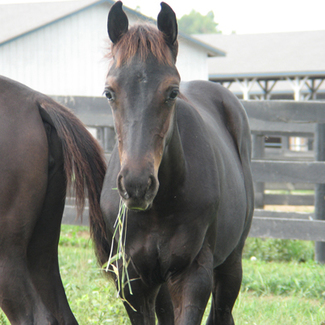Learning
July 10, 2014
Written by: Keith Hosman
Written by: Keith Hosman
|
Any time you set out to improve yourself, whether to be a better rider, a more accomplished pianist or a more "learned law student," you'll come out ahead if you challenge yourself to learn one specific thing that makes your time well-spent. From an equestrian's perspective, this means that you don't put down a training book till you've committed to memory some small fact that you can later put to use. It means that you keep querying the next pro trainer you talk to till you glean some piece of info that you can tuck away, something to call upon in the future. It means you sit in the stands at your next riding clinic, waiting, waiting, waiting for that single piece of knowledge that makes the cost of gas it took to get there pay off.
Training is simply a matter of stringing together small, simple concepts. And, when things are going awry, it's often because something small hasn't been taught, is being overlooked or is being dismissed as "unimportant." 
To put a finer point on this, don't go to your next clinic or through your next riding lesson trying to remember everything the pro tells you. You'll lose the trees for the forest. Information will wash over you and a day or so later, you'll throw up your arms in exasperation because you're not a tape recorder and you've forgotten what comes after this or that. You'll be frustrated and make zero improvement. (This is why training DVDs and books exist.) Instead, concentrate on picking up one, single thing. Wait for it, then chew it up in your head, imagine putting it to use, ruminate, ponder and reflect. Ask questions. You know something best when you're able to teach it to someone else, so repeat it back to your instructor or mention it to another student. You've invested time and money to be there; challenge yourself to find one simple concept that made your trip worthwhile - and make sure you really know it. (Buy the DVDs if you need a frame-by-frame replay.)
This holds true even if what they're teaching is something you "already know." Everybody approaches their training from a different perspective. Needs change, you change, your horse changes. There's always something to learn: a quicker method, a deeper understanding, even what not to do. I'm certified by John Lyons - but frequently attend clinics put on by other trainers. I never attend a Clinton Anderson or Craig Cameron event, for instance, that I don't come away with a ton of new things to try out. They have a different take on things and training methods are constantly evolving universally. So are my needs. Today I know thirteen ways to get a lead departure but maybe tomorrow I ride a nightmare horse and I'll wish I had fourteen. And I'm not talking about sitting there waiting to learn something huge ("flying lead changes") - I'm talking about picking up nuggets of information (how to get the hips to move a step to the right or why you'd even want to move the hips). Trying to learn everything will overload your brain and cause you to remember nothing. Strive to "understand," not to memorize. Once you've got your "one thing" down, begin listening for the next. Collect enough "info snippets," string them together, and you'll know how to get your horse to do x, y or z (or how not to do x, y or z). As a point of reference: When I attend a clinic, I can usually pick up two things, three on a really good day, that make it worth my time.
As an aside, don't forget that "learning what not to do" also qualifies as "something learned." Example: The guy riding in the clinic next to you has borrowed a horse. The owner assured him "little kids ride Flicka all the time." Seconds later, the guy gets bucked off. You might then think: "Note to self: If someone says a horse can be ridden, have them ride the horse first." Simple concept, big repercussions. Note: Quite often what you'll learn is something somebody's tried to teach you before and it just now "sinks in." Or a fellow rider might dismiss your new understanding as "just common sense." Or maybe it's something you knew before, but forgot. Maybe it's something that everybody else at your riding level has known for eons and, frankly, you'd be embarrassed if the others found out that you just found out how to ask for a lead departure. Take heart! They're all legit "take-aways" if they matter to you today. Example: Maybe you never needed to know how to "move a shoulder" before but today you realize how they can help get your lead departures. Horse training isn't all that complicated, so be on the lookout for these small epiphanies - they can add up to significant improvements. Tip: Teach almost anything to your horse with the "Clock Work Exercise." That's a chapter in the basic training book "What I'd Teach Your Horse" - and you can hear the whole section right now for FREE on audio when you click here.
Many, many, many times I'll work with riders at my clinics that have had a problem with their horse for years and years. They've come to me out of exasperation and now they expect to see some sort of magic solution. I truly believe they think I'm going to push some secret hidden button on the horse and suddenly he's fixed. Two days later we've got them well on the road to recovery - but without making some deal with the Devil. How? Simply by running back through "basic training" to find what's been skipped. If a certain screw works its way free in your car's engine, it'll stop running. Same thing with your horse. Something very small can bring your training to a screeching halt. And: Many times the problem can be caused by including a particular step in your horse's training - but doing it "wrong." Examples: You don't release at the right time; you apply too much pressure, restraining the horse's natural movement; you're too timid, you're too aggressive; the horse's (body part) is here when it should be there... Basically, you're glossing over a step, not being as precise as called for in the horse-training recipe. Often, if you're honest, you'll admit that a trainer or instructor has told you the same thing hundreds of times - and you've blown off the advise with an "I tried that." If I had a dollar for every time I've made a suggestion only to hear "I did that" or "I'm dong that" - when I can clearly see they're not doing diddly, I'd be a rich man. Bottom line: If you follow the instructions in one of my how-to horse training books or articles and your horse still hasn't got it, then you're not doing one of the steps correctly - you only think you are. Wanna teach your horse to drop its head and stay relaxed? When you're finished with this article, click here to read about the "Classic Serpentine."
|
|

